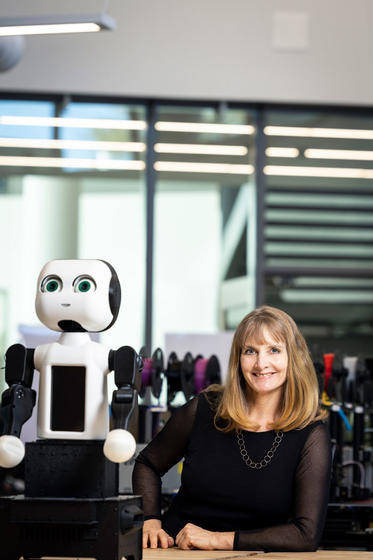As one of the U.S. Navy’s first female fighter pilots and an engineer, Mary “Missy” Cummings is accustomed to breaking barriers and solving problems. So, when the opportunity to develop a new interdisciplinary program in artificial intelligence (AI) at George Mason University’s College of Engineering and Computing emerged, she didn’t hesitate.
Cummings wants to increase the public and workforce’s understanding of AI and its limits.

For example, self-driving cars have proven to be much more difficult to launch safely than originally believed. Before coming to Mason, Cummings served as the senior safety advisor to the National Highway Traffic Safety Administration. She said that experience sparked her interest in a new program in the design and deployment of AI.
“I believe we have a national security crisis across the Department of Transportation, the Department of Defense, and many other government agencies,” Cummings said. “We have a genuine technical illiteracy problem. It’s not that people can’t understand AI. It’s that people are just not being educated in how AI is constructed or in its limitations.”
Cummings encountered tech illiteracy problems earlier in her career while serving on the Defense Innovation Board.
“I saw the problem then, and now that I’ve been in the Department of Transportation, it’s doubly reinforced my concern about people’s limited understanding of AI,” she said.
Cummings wants industry and government employees to know how to ask the right questions about performance weaknesses and understand where to invest tax dollars.
She said she’s concerned the U.S. doesn’t have an effective workforce when it comes to understanding, managing, acquiring, evaluating, and testing AI. She wants people to learn about the right way for humans and AI to work together as well as to learn what is truly attainable and what is merely hype.
“I think traditional academia has a hard time accepting new areas, like a degree program in the design and deployment of AI. Older schools with more ingrained traditions struggle to embrace newer thinking,” she said. “I don’t think Mason is like that. Dean Ken Ball and others at the College of Engineering and Computing as well as Mason’s president Gregory Washington have embraced these ideas.”
“Missy’s knowledge and experience surrounding AI are going to be a phenomenal asset to Mason,” Ball said. “Her ability to make connections between computer science, electrical, and mechanical engineering fields and leverage the strengths of each to improve our understanding of AI will be a game changer. We are thrilled she has decided to work with us.”
Cummings is proposing a new degree program in AI that will target engineering students as well as those in policy, law, and public health. “To navigate the world of AI students also need softer skills in policy, and maybe even ethics,” Cummings said.
“I find that Mason is far more flexible and more open to new ideas than older more entrenched schools. At Mason, people are willing to come together from the different colleges and schools to solve real complex sociotechnical problems,” she said. “There’s not one societal problem we have today that belongs to a sole discipline.”
Her faculty appointment spans three departments—Computer Science, Mechanical Engineering, and Electrical and Computer Engineering. She will also be the First American Bank Endowed Chair and Director of the Center for Robotics, Autonomous Systems, and Translational AI. Cummings’ scholarly work will include opportunities to work with Fuse at Mason Square faculty and partners. Fuse will launch in 2024.